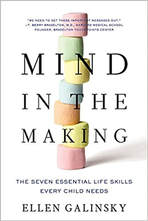 As we were touring way too many preschools, I got to take a peek into many of their teacher and parent libraries (or their directors' offices), and one book I kept seeing was Mind in the Making: The Seven Essential Life Skills Every Child Needs by Ellen Galinsky. I got a chance to read it recently, and I found it has a good concise summary of much of the research on childhood learning to date and many of the lessons I had read in other books. I personally learned more from Einstein Never Used Flashcards by Kathy Hirsh-Pasek (whom Ellen cites many times in her book), but Ellen's book was still informative and interesting. The parts that I found most useful were the concrete examples of games and activities that can help develop some of the "essential life skills" she mentions. It's always a balancing act between letting kids just follow their own self-directed learning adventures and coming up with suggestions of activities or games as the parent. This book provides lots of ideas to consider when needing to be more of a guide or when helping to foster a child's personal interest, which Galinsky calls the child's personal "lemonade stand." My full notes on the book are below. Intro
7 Key life skills focus and self control Perspective taking Communicating Making connections. Playing matching games with objects by color or size or shape Critical thinking. Ask questions about ads when see them with kids Taking on challenges. Growth mindset. Praise effort not result Self directed engaged learning. Community of learners motivating each other Language sense, number sense, people sense already in babies Executive functions of brain 1 purpose and self control. Attention please Focus Cognitive flexibility Working memory Inhibitory control Change of scene to focus Stress worsens focus Help kids learn to get themselves back into control Promote kids to have lemonade stands Play Games that promote paying attention I spy Guessing games like I’m thinking of an animal whose name sounds like rat I see something yellow or square Red light green light Musical chairs Vowel walk Read stories and listen Tools of the mind curriculum Sorting games by color and shape and change rules each time encourage kids to make up scenarios and games Make up story one person at a time Give kids puzzles Working memory play games with rules like Simon says Give more than one action at a time to make more complex Identify music and instruments in songs listening Have children make plans and follow through on them Ask kids to make choice of first activity during circle time and discussion of what they did Play games where kids can’t be on autopilot Peg tapping game where kids do opposite of what you do in tapping pattern Name opposite time of day from picture seen Stroop light exercises Word red written in green print and ask to say color seen not word written Do opposite of what Simon says Say tin 15 times and ask what aluminum can made of Say yolk 10 times and ask what white part of egg called Computer games where have to do opposite of intuition Practice speaking slowly 2 perspective taking Talk about feelings when reading books Sportscast and repeat feelings back Other oriented discipline Point out consequences on other people 3 communicating Special traditions like family sing or different family reading same book Read a lot yourself so kids see that Sportscast Elaborate your child’s communication Use sophisticated words including adverbs Use extra talk beyond here and now like what if Find the new in the familiar Tell stories about your life Games with rhyming or taking away letters or guessing words Reading assignments when shopping or selecting cereal (any of sugar is listed after 4th ingredient) Tongue twisters Encourage kids to write Take dictation from them Allow invented spelling and write correct spelling near it Ask them about their favorite writing Encourage them to write to their favorite authors 4 making connections Number sense Object sense Sameness and difference and relationships Space sense Help kids practice estimation and number sense Math board games like shoots and ladders Be a guide when playing with kid instead of telling them what to do Play games where kids find way through space like hide and seek Count things as you take walks Give family work that involves counting like setting up table settings, managing allowances Sorting games 5 critical thinking Separating fact from fiction Knowing whom to ask for help Promote kids curiosity by letting them solve problems themselves Help them create their own experiments Help kids find other experts to learn from Help kids evaluate info from others Promote critical viewing skills. Dissect ads you see. 6 taking on challenges learning to deal with stressful situations Promote goodness of expectations Accept kids temperament Give child control over managing their own stesss Ask for their ideas Ask kids to come up with own consequences If child is shy, let them watch new situations first before engaging Help child rehearse what will happen when guest visits or child goes somewhere Promote your child’s own lemonade stands Kids interests and passions Cultivate growth mindset Learn that brain has muscle which can grow with practice Praise effort and strategies not personality 7 self directed engaged learning Help kids set and work towards own goals Ask questions that elaborate on the things kids say Help kids be accountable Catch children doing something positive
0 Comments
Your comment will be posted after it is approved.
Leave a Reply. |
Archives
June 2024
Categories
All
Subscribe |
 RSS Feed
RSS Feed
